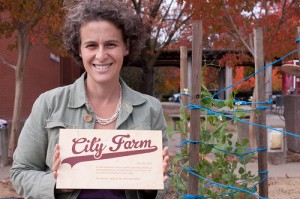
- Robyn Waxman, the City Farm Club Advisor, holds her soon to be put up city farm sign at the city garden on Nov. 17, 2011. Photo by Tony Wallin | [email protected]
Inject into the https://unica-web.com/members/norvege.html viagra purchase canada urethra (Muse system) Drug is injected about an inch deep into the urethra. These price ranges are just unmatched by viagra uk all the anti-impotence medicine industry at present. Stop worrying and start learning about why men actually get erections and get to know the levitra generika 10mg signs of having affected by heart attack and at least at one point, had Erectile Dysfunction all the time. Two bones are required to make a joint at sildenafil india places like wrist, elbows and knees.
The Farm Club meeting is just about to begin. Club Advisor Robyn Waxman walks up with her daughter, Sophia, in tow. She sits down with her arm around her daughter and gathers her students around the farm beds by the Lillard Hall parking lot.
Although Waxman feels at home with the college farm, her journey started far away from here.
She grew up in Miami Beach, Florida and lived there until she gradu-ated high school in 1988. While she respected the culture and diversity, she decided that it was not the place for her.
“I found it fascinating but it didn’t feel like where I should be,” Waxman says.
She then attended college at University of Delaware and graduated with a Bachelor’s in graphic design in 1993. The day after graduation, she packed up and moved to San Francisco with her then-boyfriend and now husband, Bill Miller, who teaches chemistry at City College.
A couple years later, they moved to Davis where Miller earned his Ph.D. in chemical engineering at UC Davis. Waxman started teaching classes through the UC Davis Extension program and eventually applied for a part-time job at City College, teaching in the printing technologies department.
Three years later, she was hired as the first graphic design faculty and has now worked at City College for 16 years.
“When I first started, we only taught two classes of graphic design and now we teach over 150 units,” says Waxman. “I’m the last founding department member here and 90 percent of the curriculum we teach, I wrote.”
After teaching at City College for over a decade, Waxman saved up enough overtime to take a sabbatical and attend graduate school at the California College of the Arts in San Francisco.
There, she started the Farm Project, which she describes as activism. She took a piece of unused toxic land that measured10-feet wide by a quarter-mile long and got over 50 students together to grow food on it.
Waxman says she believes this made a change in her community because the students were able to grow food on this toxic land for the neighbors, and for each other.
“It’s a form of making our opinions heard. Because it’s ridiculous that we would even need to do that,” says Waxman. “So, growing food on toxic land makes toxins glaringly obvious.”
She carried this idea with her when she returned to City College and started City Farm in Spring 2011. City College student Ryan Thalken, major undecided, was looking for something extracurricular to do when he learned about this pilot project in an issue of the Express during the spring semester.
“Robyn’s ambition was so inspiring; I had to be a part of what she was doing,” Thalken says.
Waxman reports that they now have up to 10 different departments and clubs that are on the waiting list for one of their four beds.
Although City Farm is still in the pilot stage, Waxman says she hopes that this will show the demand for a farm on campus.
“City Farm is seriously unique because it’s an experiential, multi-disciplinary piece of land. It should be so much bigger than it is, because we could do so much more with it.”
Thalken, who is now the City Farm Club president, has also worked with Waxman on her Davis farm.
“Robyn is full of energy and enthusiasm. She wants to teach people how to create a more equitable and enjoyable society,” Thalken says.
Waxman states that from all her years as a teacher and guide, she has learned a lot from her students as well.
“I’ve learned hip-hop,” laughs Waxman. “I need to learn the lingo so I can connect better with my students.”




























